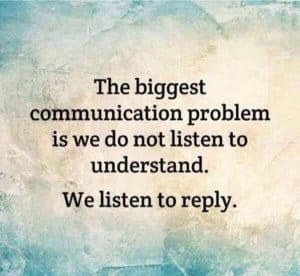5 Ways To Annoy An INFP
Today I’m thrilled to talk about the ultimate Idealist; the INFP. INFPs are gentle, insightful people who care deeply about the human race. They are determined to find their purpose in life, to find meaning, and to make a difference for humanity. INFPs are thoughtful and sincere, and prize authenticity and kindness. A.A. Milne, William Shakespeare, Edgar Allan Poe, and Vincent Van Gogh were all INFPs! As you can see, they have a knack for creativity, writing, and expression.
Of course, for the subject of this post I wanted to find out what really bothers INFPs and what particular traits especially get on their nerves. I asked in forums, groups, and checked out my Myers-Briggs® books to get an idea. Here are the five things that got mentioned the most:

Not sure what your personality type is? Take our new personality questionnaire here. Or you can take the official MBTI® here.
Arrogance
“A fool thinks himself to be wise, but a wise man knows himself to be a fool.”
– William Shakespeare, INFP
INFPs value humanity in all its various shapes and forms, and can see nothing more detestable than people who think they deserve better or are somehow “above” anyone else. The INFP sees every individual as full of possibilities and potential. INFPs are champions of the underdogs, the downtrodden, the misunderstood. They will have an open mind to hearing anyone’s problems or concerns, but they are extremely turned off by arrogance and entitlement.
Phoniness
INFPs value authenticity highly and always seek to be true to themselves and their deeply-held personal values. Dishonesty and pretentious behavior turns off the INFP tremendously. As mentioned above, the INFP will have a very open mind towards nearly anyone – but being yourself, being honest, and being authentic are extremely important to them.
Narrow-Minded Judgments
“I believe in everything until it’s disproved. So I believe in fairies, the myths, dragons. It all exists, even if it’s in your mind. Who’s to say that dreams and nightmares aren’t as real as the here and now?”
– John Lennon, INFP
INFPs are extremely open-minded and imaginative. They see the world as full of endless possibilities and forces. They often deal with being stifled in their youth by people who find their creative musings and insights “unrealistic” or “impractical”. Because INFPs make up only 3-4% of the population it is often rare that they find people who can appreciate and understand their inner world and imaginative personality.
Being Put On the Spot
“I’m shy, paranoid, whatever word you want to use. I hate fame. I’ve done everything I can to avoid it.”
– Johnny Depp, INFP
INFPs are often shy and reserved and are made incredibly uncomfortable by being pushed into the limelight. While they are drawn to creative endeavors that may bring them attention, they are extremely self-conscious about being the center of conversation or the object of scrutiny. They’d much rather enjoy their creative freedom without the attention that goes along with it.
Poor Listening Skills
INFPs have incredibly strong listening skills; in fact, neuroscientist Dario Nardi, said in his book The Neuroscience of Personality that INFPs “often enter a special listening mode. They are consummate listeners. They thoroughly engage all brain regions that process voice, words, and sounds; moreover, they may easily enter a unique whole-brain state when listening to other people, whoever those people might be.” Because the INFP has such excellent listening skills, they are often disappointed when they aren’t met with the same courtesy by others. They especially hate when people try to jump in and “fix” a problem when they are trying to discuss their feelings or emotions. They would much rather be listened to fully first, then receive empathy and understanding, then solutions.
The INFP and Stress
What Do You Think?
Are you an INFP with an opinion on this post? Feel like sharing your pet peeves? Let me know in the comments!
Find out more about your personality type in our eBooks, Discovering You: Unlocking the Power of Personality Type, The INFJ – Understanding the Mystic, and The INFP – Understanding the Dreamer. You can also connect with me via Facebook, Instagram, or Twitter!
Other Articles You Might Enjoy:
10 Things You Should Never Say to an INFP
10 Surprising Truths About INFPs
Why INFPs and INFJs are Drawn to Sad Things
Subscribe to Our Newsletter

Want to discover more about personality type? Get the inside scoop with Susan Storm on all things typological, along with special subscriber freebies, and discounts on new eBooks and courses! Join our newsletter today!
















These are spot on, but I only see 4 things instead of 5
These are correct. However, I (and this may just be me) don’t like being thoughtlessly tossed under a blanket statement, even if it’s right about me.
Same here
I don’t like my intelligence being insulted by bad argumentation. Circular logic, appeals to authority (particularly if said authority is make believe) and appeals to identity. I don’t like being held to a deadline even though I know I need to have one because it makes me feel like a machine doing things for doing things sake.
I identify with all of this, but find that while I can be hyper-focused on listening to someone else, if I’m not hyper-focused, I get distracted by all of my own thoughts and emotions, which makes it very difficult to pay attention and listen.
Yes! Me too. I have to try extra hard to actually pay attention to what people are telling me because I’ll get lost in my own thought and imagination.
I thought the exact same thing when I was reading that part. I am easily distracted when in conversation by my thoughts. Conversation sends my thoughts whirrling in my head which makes it difficult for me sometimes to share equal head space for the thoughts my conversation is provoking and respecting the person I am talking with. I am very aware of this and I really want to improve my ability to listen.
OMG yes! This happens ALL The time in all situations!
I absolutely relate.
If only my ex fiancee saw this post months ago lol
I agree with this to an extent, but struggle with generalisations and no context. I am a great listener if the topic explores the things of interest. If someone is talking about accounting, i practice my powers of dissociation.
It takes years and years to accept that the whole-brain listening you provide is very rarely reciprocated. However, because what you bring is so rare, you’ll find people gravitating towards you over time saying things like “I don’t know what it is about (insert terrific INFP name) but it’s amazing to speak with them about my ambitions, ideas and plans. They give me incredible feedback like no one else every has…”
Bottom line — your gifts are valued. Be patient. Enjoy the journey of guiding others.
Well this explains a lot! My warning antenna has always sounded off in the presence of disingenuous people. I did take it personally as I equate it with lying which I abhor the most in life. That someone would convey information to purposely deceive you and insult your intelligence in the process, is something I don’t tolerate well. Arrogance amuses me – so long as no one is harmed by it. Other personalities are only too happy to take these folks down a peg. Like others the lack of being listened to is soul-crushing. It is far too easy to expect reciprocity on that front from those who value it less. If I had a dime for every time I have said “You did not listen!” To those around me, I probably could put a serious dent in the national debt. 😉
Sometimes having superior listening skills can have it’s drawbacks. I can remember previous conversations pretty much word for word, so if someone attempts to present me with different versions (read: alternative facts’) I won’t be swayed. People tend to not like being caught in lies!